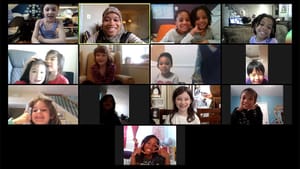Stay in the Loop
BSR publishes on a weekly schedule, with an email newsletter every Wednesday and Thursday morning. There’s no paywall, and subscribing is always free.
Living conspiracies, teaching truth
When conspiracies aren’t theories: what is COVID teaching the next generation?

“Do you think things are going to get better?”
My students, six high-schoolers between 13 and 18 years old, stared at me expectantly from my iPad screen after one of them asked me the question. As minuscule as they were in the Zoom interface, the urgent pressure of the moment weighed on me until they may as well have been sitting right there at my dining table.
Protests in the pandemic
This spring I have been teaching a virtual class on news literacy for Mighty Writers, a Philadelphia-based nonprofit. Mighty Writers teaches writing and critical thinking to preschool through 12th-grade students from underserved communities in the Philadelphia area; most students participating in its programs (including mine) are from underrepresented racial and ethnic minorities in the US.
My class, called Conspiracy Outbreak, teaches students how to engage critically with the information they receive about COVID-19, giving them tools to discern what’s true and what’s not in a news and social-media environment poisoned by pandemic levels of misinformation.
My seventh class in the 10-class course fell on the fourth day of the nationwide protests against the police killing of George Floyd. As the protests and unrest continued to grow, I decided to pivot away from discussing coronavirus in order to talk about what was happening. But though I knew I wanted to talk about the protests, I didn’t actually know what I was supposed to say about conspiracy theories that didn’t suddenly feel blatantly false.
Because my role as a teacher at a nonprofit dedicated to counteracting the effects of generations of systemic inequity in Philadelphia underscored a reprehensible reality: my students are living inside the heart of a massive conspiracy that is not theory but truth: the conspiracy that America has devised against their existence.
America’s intention
The events around us—the protests, the unrest, the visceral societal rage—are not just happening because of the acute crime of the murder of George Floyd at the hands of the police. They are happening because of long-existing systemic inequities for which George Floyd's death became the point of inevitable volcanic eruption. The Philadelphia schools my students attend are being progressively defunded and then closed, and then retooled into apartment buildings and beer gardens for urban professionals. In the remaining schools, students of color are disproportionately more likely to face disciplinary action for the same perceived infractions as white students, up to and including expulsion, and are more likely to end up incarcerated for minor offenses that will often barely earn their white peers a slap on the wrist.
If they do successfully graduate high school and get into college, students like mine will likely have to take on significant debt in order to fund their educations, as tuition prices rise and federal funding for tertiary education continues to drop. But the law will not allow them to discharge that debt in bankruptcy should they find themselves unable to pay if off, which is a looming result as inflation-adjusted wages continue to stagnate and more jobs either leave the country or become automated. And if they do manage to clear all those hurdles, the American holy grail of homeownership is further out of reach for them than it is for their white counterparts, between the enduring twin legacies of redlining and housing-loan discrimination. Plus, they’re less likely to have the savings—whether generationally inherited or personal—to even be able to think about buying a house, now or ever.

So how do I insist to them, as the teacher of a class titled Conspiracy Outbreak, that we must break down conspiracy theories—when their whole lives are demonstrably tied up in America’s intention to see them fail? How do I instruct them that conspiracies are an unhelpful distraction from the truth with respect to their health during this pandemic, when the larger truth of their collective lives adds up to a societal determination to destroy their lifelong health? The easy answer would be to assert that these are two different things: a health issue and a societal one. But COVID-19 is itself hitting non-white populations disproportionately harder, with worse outcomes in both treatment and survival, so they cannot be separated at all—these issues are, in fact, reinforced in the ongoing pandemic's realities.
“Soon enough”
This was all at the front of my mind as my student asked her question. And as their teacher, as a person who against my better judgment and knowledge is mostly oriented toward hope, I wanted desperately to be able to say a simple “Yes.” However, as a Black woman in America who is two decades ahead of them in experience, to give a cleanly comforting answer felt wrong. Things are likely to get worse, or at least more complicated, as the world roils through what feels like a real generational shift in thinking around institutionalized racism. And as they get older, my students are certain to encounter painful incidents of discrimination that will reshape them as individuals and impact their dealings with their communities. No Pollyanna-style answer from me will inoculate them against that.
I ultimately decided upon a middle ground that didn’t lie about the present, but invoked their agency in their futures. “I think things will get better soon enough,” I said. “I think it will take all of us, in society, working together to get there though. Looking at all of the thought and consideration you all put into your lives—I think we’ll get there.”
And that answer really did feel true. Things are not okay now, but my students will play important roles in bettering their collective future. As their teacher, my role in their lives is to equip them with the tools to exact their agency confidently once I am no longer there. The next time I teach a class on conspiracy theories, I don’t want to have to take into account conspiracies that are actually in practice. America endeavors to break the spirits of students like mine so that they’ll comply with their own oppression; I won’t comply, and my hope is that soon enough, a critical mass of people will not either.
Sign up for our newsletter
All of the week's new articles, all in one place. Sign up for the free weekly BSR newsletters, and don't miss a conversation.

 Michelle Chikaonda
Michelle Chikaonda